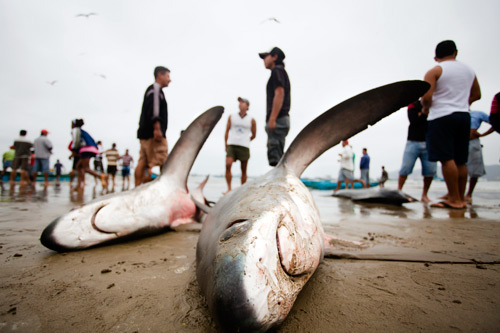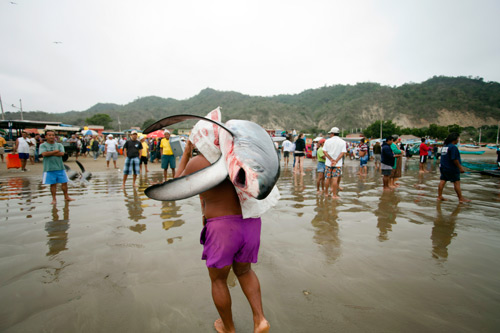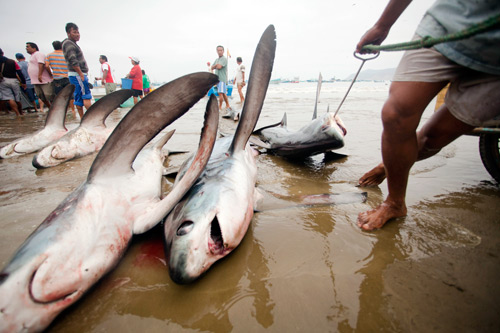Sharks at Risk
By Jean-Michel Cousteau

The ocean’s supreme hunter cleaves through the sea in dauntless pursuit of his prey. At the top of the food chain, he fears no other species. Using cunning and relentless force, he tracks his quarry, which can only feebly resist. He has one mission and one mission only: to kill. This predator is not, as most would immediately think, the great white or any other shark. In fact, sharks are the prey. The true predator is Man. Humans are the butchers of increasingly threatened populations of sharks around the world. These majestic and ancient animals are the ‘lions and tigers of the ocean,’ and much like their terrestrial counterparts, they are being decimated and driven to extinction by humans in a tragically wanton and wasteful manner. Every year, humans slaughter over a 100 million sharks, often simply for their fins to make shark fin soup, a delicacy primarily found throughout Asia. Sometimes weighing in excess of 300 pounds (136kg), sharks are dragged aboard fishing vessels, sheared of their fins, and then thrown back bleeding into the ocean to die. This horrific practice defies reason. The world should be angered by such gruesome acts and the depletion of such a critical thread in the fabric of life in the ocean world. Why do so few people care about this carnage?
It’s clearly a matter of human perception. Sharks are inaccurately portrayed as vicious, bloodthirsty, and man-eating killers. From the original 1975 movie Jaws and all its sequels, to 2004’s Open Water, the film industry and the media ‘feeding frenzy’ it has created has been a fanatical accomplice in this ongoing crime against nature. Sharks are, unfortunately for them, not cuddly creatures. They aren’t koala bears, orangutans or sea otters. We don’t mourn their loss; instead we frequently applaud their demise. We don’t understand them and have been infected by myths while a deadly efficient industry has been allowed to methodically exterminate sharks for mere portions of their bodies. That is why we are presenting Sharks with 3D Entertainment Ltd., currently in IMAX theaters around the world, and Sharks at Risk, a television special that is part of the Jean-Michel Cousteau Ocean Adventures PBS series debuting in 2006.

11,000 Sharks Per Hour
Our goal is to dispel the myths and correct the inaccuracies that make sharks one of the most misunderstood animals in the ocean. Our message is clear. Sharks have far more to fear from us than we do of them. And, unless we curb the killing of these creatures, we will irrevocably lose some of our planet’s most magnificent species. Sharks have roamed our water planet for more than 400 million years. There are more than 400 species of sharks, but only 68 are considered potentially dangerous. Of those, only four or five are occasionally involved in harmful situations with people. Sharks do not instinctually pursue humans as food. Most shark attacks are cases of ‘mistaken identity’ in which sharks believe they are feeding on fish, sea lions, seals or other marine mammals. On average, there are 100 shark ‘attacks’ on humans each year around the world. Only about a dozen are fatal. More people die each year from bee stings, dog bites or slipping in bath tubs.
For every single human fatality from an encounter with a shark, we kill 10 million of them – roughly 11,000 sharks every hour of every day. The result is simply devastating. Over 120 species of sharks are currently listed as threatened or endangered. The implications are enormous. As apex predators, sharks play an important role in maintaining the health of the ocean’s ecosystem. Serious decline in their numbers affect many other species, and there is clear evidence that some fish stocks have collapsed because of a reduction in shark numbers. Certain species of sharks have already plummeted by as much as 80 per cent in the past decade, and are well on their way to becoming extinct within the next 10 years. Since 1986 in the Northwest Atlantic, hammerheads have declined by 89 per cent, white sharks by 79 per cent and tiger sharks by 65 per cent. All recorded shark species, with one exception, have declined by more than 50 per cent in the past eight to 15 years. The rapid slide is even more acute in some populations, such as the whitetip shark in the Gulf of Mexico, where humans have eradicated 99 per cent.
Sharks simply cannot keep up with this onslaught without our protection and help. They have a slow growth rate, late maturity, low reproduction rates, and one of the longest gestation periods of any animal (up to 22 months). They cannot replenish themselves as quickly as we humans are killing them off. Many sharks are caught as by-catch in fishing nets, or as a result of long-line fishing practices. But the real culprit is shark finning to feed the insatiable appetite, mostly in Asia, for shark fin soup, which can sell for as much as USD$100 a bowl. Ironically, some shark fins contain toxic mercury that is potentially harmful to humans. Singapore and Hong Kong are consistently the biggest importers of Indonesian shark fins, a principal source for the product. From 1996 to 2002, Indonesia exported over 1,595 metric tons of dried shark fins to Singapore alone.
Technology Boosts Bans
But, the problem has stretched from China to Latin America to Africa and the United States. The U.S. banned shark finning in the Atlantic in 1993. But, the practice exploded in the Pacific. In Honolulu, 2,289 sharks were landed in 1991. By 1998, the number jumped to 60,857 – a 2,500 per cent increase. Ninety-nine percent of the catch was for fins. The U.S. banned shark finning in federal waters in 2002, and barred U.S. vessels – anywhere in the world – and vessels of other nations in U.S. waters from possessing shark fins unless the rest of the shark’s carcass is also on board. Shark meat is considered of low value to fishermen. There are some promising signs for sharks, though. Shark finning bans already exist in South Africa, Brazil, Costa Rica, Canada, Namibia, Ecuador, Palau, the European Union, the U.S., and most Australian States and Territories. The first international ban on shark finning in the Atlantic, including 60 countries, was adopted in November 2004 by the International Commission for the Conservation of Atlantic Tunas (ICCAT) in response to the worldwide outcry. Enforcement of shark finning bans will always be a problem, especially when profits remain high. A single basking shark fin, for example, can fetch USD$6,000 or more. In 2002, authorities boarded the Honolulu-based King Diamond II, 350 miles (560km) southeast of Acapulco, and discovered 32 tons of shark fins – the biggest shark fin seizure in US history. The cargo was bound for Guatemala and an eventual sale in Hong Kong.
Some technological advancements are helping. A research team in Florida has developed a genetic test to help wildlife experts crack down on the illegal trade in shark fins. Small bits of fish flesh can be removed from bins aboard ships or on docks to test to see whether they are protected sharks, and severe fines can be levied. A new DNA test can now identify the flesh of a Great White, which is protected under the Convention on International Trade in Endangered Species. But sharks are still under-protected in many parts of the world ocean, and populations continue to decline at a precipitous rate. As Steven Galster, Asia Regional Director for Wild Aid expressed it so well, “The killing will only stop when the demand falls.
“We still have not won,” he said recently. “A true victory will only be when shark fin restaurants fade from the scene.” Ultimately, only public awareness and education will save the planet’s sharks. Wild Aid has mounted such a campaign in Thailand and has successfully fought off local lawsuits by shark fin traders and restaurants, attempting to prevent them from publicizing the brutal slaying of sharks. A recent survey in Thailand indicates they are making progress. Thirty-two percent of the respondents said they no longer purchase shark fin soup. This, however, is only one battle in a larger war. A growing middle class in China, for example, means 250 million more Chinese can now afford the ‘delicacy’ than just 10 years ago. Many Asian celebrities, including Ang Lee, director of Crouching Tiger, Hidden Dragon, have appeared in public service announcements to combat cultural acceptance of this barbaric tradition. More needs to be done to destroy the myths and build appreciation for sharks as a productive species on Earth. Time is critical and we cannot ignore our responsibility to right the wrongs done to these amazing creatures. We are speaking out through Sharks and Sharks at Risk by connecting the true story and images of sharks to many of those who fear them. We hope to reach millions of people who will see the real beauty instead of the fabricated beast.

Become A Champion
On every dive when I am in the presence of these ancient masters, I am reminded how human abuse of the sea is throwing the entire system out of balance. But we now have the knowledge to respect and protect all parts of the web of life within our liquid planet including one of the most feared animals of the sea; sharks.
And in California we have the opportunity to pass AB 376 by writing to Governor Brown and express the urgency to pass this important legislation that is the best step the state of California can take to end our contribution to the global shark fin trade. This is a perfect example where we can be a part of the long-term sustainability of our oceans by closing the loopholes in shark finning. Shark fin soup is a key reason why one-third of the world’s shark species are now threatened with extinction. But change like this starts with the individual and I hope I can offer some inspiration on why we should all care and take action. Sharks are at risk and AB 376 is one step in the right direction to protect these valuable species on a global level.
I respectfully ask all you fellow divers, OFS supporters, to become ocean champions by doing your part to ensure sharks will remain in our oceans for another 400 million years!
One Response to “Sharks at Risk”
Leave a Comment








JohnAdled
Excellent post! Really loved it, havent seen an artice this good in a while.